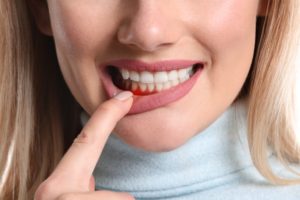 Since February is Gum Disease Awareness Month, you should be thinking of ways you can improve your oral health. One easy change you can make is choosing foods that promote gum health. A balanced diet will keep the soft tissues in your mouth healthy, but poor nutrition can easily lead to an infection that could eventually cause you to lose your teeth. Below are 3 tips from a dentist for planning meals that fight gum disease.
Since February is Gum Disease Awareness Month, you should be thinking of ways you can improve your oral health. One easy change you can make is choosing foods that promote gum health. A balanced diet will keep the soft tissues in your mouth healthy, but poor nutrition can easily lead to an infection that could eventually cause you to lose your teeth. Below are 3 tips from a dentist for planning meals that fight gum disease.
1. Choose Fruits and Vegetables
Of course, anyone concerned about their health should already be eating plenty of fruits and vegetables. These foods are full of vital nutrients that help keep the body in good shape. You should include a variety of fruits and vegetables in your diet, but some are particularly helpful for taking care of your teeth and gums. Spinach, kale, and other dark leafy greens are filled with vitamin C and calcium, both of which help reduce inflammation and gum disease already present in your mouth. Also, shiitake mushrooms contain an antibacterial compound called lentinan that can fight against the accumulation of bacteria on the teeth and gums. As a result, your risk of gum disease will significantly decrease.
2. Make Sure You’re Drinking Plenty of Water
You need to drink a certain amount of fluids each day. Unfortunately, many beverages such as soft drinks and fruit juices contain harmful sugars that the bacteria in your mouth can use to damage your teeth and gums. While there are plenty of sugar-free alternatives, your best choice will always be water. By sipping on water throughout the day, you can clean your mouth and wash away the bacteria, acids, and food particles left on your gums.
3. Limit the Amount of Sugar in Your Diet
One of the worst things you can do when it comes to gum health is to constantly snack on sugar. The longer sugar remains in your mouth, the more likely it is to lead to gum disease and other problems. Enjoying some candy or other sweet treats every once in a while shouldn’t be an issue, but you should only ever eat them in moderation. (Be especially careful around gummy or chewy foods; since they stick to the teeth, they give oral bacteria more time to feed on the sugars they contain.)
Of course, even with the above tips there will always be a chance that gum disease develops in your mouth. You should be ready to call your dentist to ask about gum disease therapy the moment you notice any inflammation or bleeding. That said, eating the right kind of meals on a daily basis will make it far easier to avoid an infection.
About the Painesville Dental Group
Here at the Painesville Dental Group, our caring and experienced team uses the most advanced dental technology available to bring families comfortable, affordable care. To make things as convenient for your schedule as possible, our Painesville office welcomes early visits as well as Saturday appointments. If you think you may need treatment for gum disease, visit our website or call (440) 354-2183.
